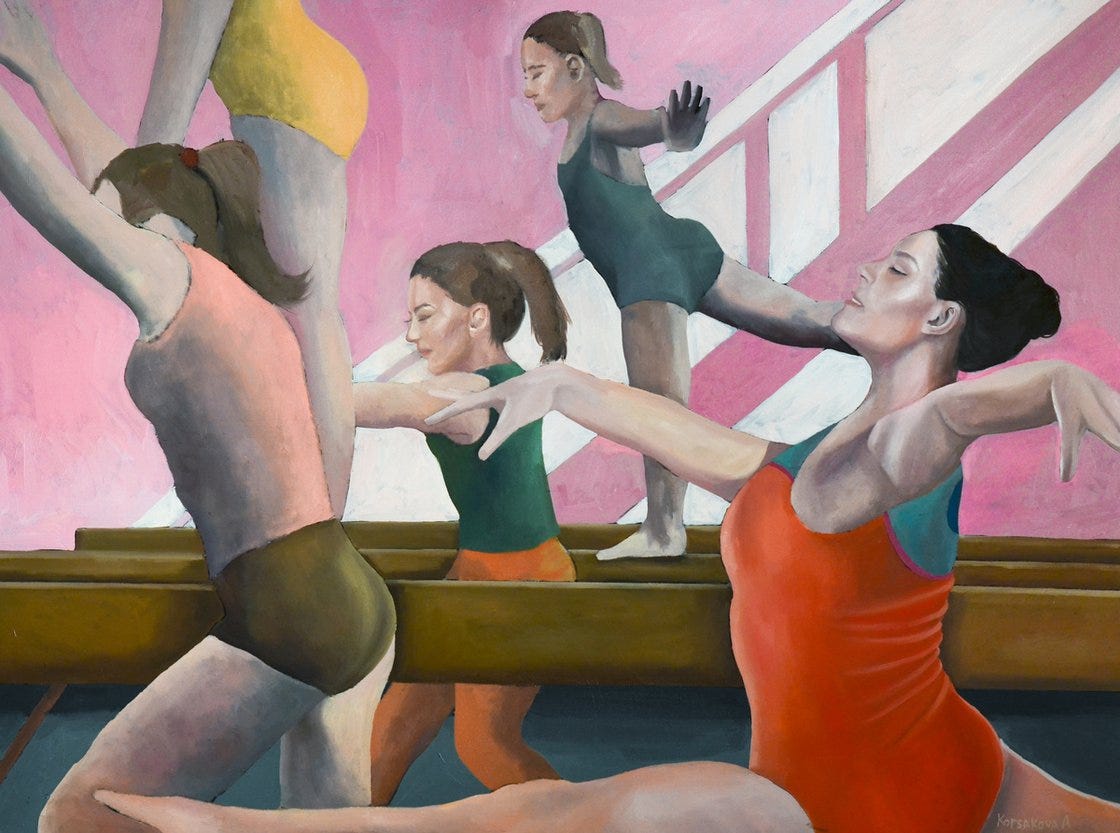I dread rock climbing. Every time, before heading to the gym, I ask myself, “Do I have to do this? No one’s forcing me.” The thing is, I usually feel great afterwards. It’s the lead up to the event that induces anxiety. Getting dressed, packing my bag, making the long journey to the climbing gym, thinking about whether I can do another 5.9 because that’s what I did last time, and I need to keep progressing.
My dread has entirely to do with the fact that I am not a good climber. I think what happens when you know you’re not good at something is you hype up the difficulty. You make it out to be more daunting than it is. It’s a defense mechanism: it can’t hurt you if you already know it’s going to hurt.
In May 2020, at the height of the COVID lockdown, I took an online writing class with the author Catherine Lacey called “The Embodied Writer.” It was unlike any writing class I had ever taken. I walked away deeply confused. My strongest impression was of hopping around my living room, pretending to be a frog.
The other day, I dug up Lacey’s email, hoping to jog my memory: what was the whole point of that frog exercise? This line caught my attention:
And as I said several times—your body is what writes the book. Your posture, your breathing, your internal awareness, all of this is going to contribute to how you write, to the voice that develops.
This actually makes sense. The way you move your body through the world—your posture, your breathing, the way you walk into a room, the way you exit a room—informs your experience of the world, and subsequently, the narratives you create about it. So, of course, your body is going to shape the voice in your writing, as well.
Acting and improv achieve a similar effect: you’re forcing your body out of its habitual postures, into new forms, and in doing so, you open yourself up to new ways of being. Our minds—our imaginations—can only do so much to conjure a character. You can imagine what it’s like to be Mick Jagger based on music, movies, shows, books, articles, but when you channel that secondhand knowledge into embodying and enacting a rock star, that’s when the awareness becomes intimate.
At the end of Lacey’s email, I got the answer to my question:
At the very least, when a character's physicality feels alien to you, it may be helpful to assign an animal to that character and try walking around your room with that animal’s physicality as a guide.
Like most writers, I spend a lot of time in my head. Even as I’m running, as I’m doing yoga, my mind wanders. I’m thinking about my characters, about a conversation I had yesterday, about work, about my next vacation, about what I’ll have for dinner. My body is moving on autopilot while I am somewhere else.
Climbing is one of the few activities that forces me to be entirely present because it triggers my sympathetic nervous system (“If you don’t focus, you’ll die.”). The physical act of pushing myself to reach a little higher or try a maneuver that looks precarious makes me feel fully embodied. I become hyper aware of my body’s limitations and how it wants to stretch. It often surprises me by taking a route that my mind would’ve written off. There’s wisdom contained in the body that the mind doesn’t have access to.
And I don’t need to be good at climbing to reap the benefits. You can be mediocre at something and still enjoy it, as long as you accept your mediocrity. Unfortunately, most people don’t engage in activities they’re bad at. When I look around the climbing gym and see that everyone is completing harder problems than me, I have to remind myself that there’s a selection bias. The people there are really fucking good because of all the hours they’ve already put in. So when I spot the lone novice who’s struggling on a V0 / 5.6, I applaud them for just being there, for not giving up. It’s time I direct some of that admiration to myself, instead of feeling embarrassed by my mediocrity.
For anyone—but especially writers and INFJs, INTJs—it’s important to engage in physical activities that get you out of your head. They expand your awareness of your body and experience of the world. But you don’t have to suffer through it. There’s a difference between pushing yourself and stretching yourself. Pushing implies coercion. You’re forcing yourself to accomplish something, which causes an internal battle and resistance (the dread I felt before going to the gym). Stretching expands your body’s capacity, but it shouldn’t feel painful. It should feel good to stretch.
You stretch by starting with what feels comfortable, not with what feels like a challenge. Progress happens incrementally, almost without your perception. But you don’t even have to become good at it. There’s value in doing an activity even if you’ll always be mediocre. Just the act of showing up and trying is enough. The key to enjoying it is to embrace your mediocrity. Celebrate it, even.




Wow I love the tie in with physicality. I never considered how important that is, but I deeply resonate. I had been thinking about acceptance recently too, esp when in conflict with another. The last conclusion I had was: in accepting difficulties in myself, I am more open to accepting difficulties in others. When I see how we are actually in parallel with each other, I'm more regulated to strategize how to move forward with the other person, instead of focusing on how we were in competition or different from each other. I am unlocked to humanize and empathize, instead of staying in the energy of victimizing myself. 💗